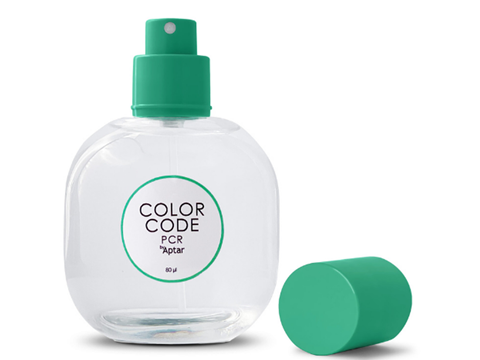
Aptar Beauty has released a new plastic fragrance pump made with post-consumer recycled resin, Color Code PCR, aiming to reduce CO2 emissions by up to 39% versus using conventional resin.
The pump is said to include up to 67% of mechanical PCR Plus material in kg CO2e per 1,000 units of the dispensing solution only, made of mechanical PCR resin (100% PCR Plus cap, 95% PCR Plus collar and 50% PCR Plus actuator and fixture) vs 100% conventional resin.
Aptar states this number has been verified by a comprehensive Life Cycle Analysis (LCA) of the raw materials using Aptar’s internal Eco Design tool. It adds that depending on the region, using this pump may also help brands avoid extra plastic packaging tax.
As a member of the Ellen MacArthur Foundation’s Circular Economy 100 (CE100) Network, Aptar has signed the New Plastics Economy Global Commitment to address plastic waste and determine new ways to design out waste and keep products and materials in use. At the end of its life, the Color Code PCR fragrance pump can apparently be recycled with the bottle in the glass waste stream.
The snap-on pump dispenses a 80mcl dose per stroke. Color Code PCR is fully customizable to achieve on-brand designs thanks to the versatility of plastic, allowing for a wide variety of colours in a glossy finish.
“Color Code PCR is a stylish step towards sustainability: it is our very first plastic fragrance pump integrating PCR. This pump not only adds a touch of colour and differentiation to fragrance launches but can also help brands achieve their sustainability goals by committing to packaging circularity,” says Giuseppe Barletta, regional platform manager EMEA for Fragrance Lifestyle at Aptar Beauty.
In related news, Unilever revealed its Wonder Wash laundry detergent bottles in April, made from fully recyclable PET and containing 35% post-consumer recycled content. 72% of Unilever’s plastic packaging portfolio is reportedly designed for recycling, with the company hoping to support the development of necessary waste infrastructure, make use of collected waste, and negate end-of-life incineration, thus lowering emissions.
Sustainaholics collaborated with easyJet to serve its full range of spirits in 100% post-consumer recycled (PCR) aluminium bottles on select flights. The bottles are apparently less than half the weight of glass and the compact shape enables airlines to fit more bottles into restricted on-board spaces.
If you liked this story, you might also enjoy:
How are the top brands progressing on packaging sustainability?
The ultimate guide to global plastic sustainability regulation














No comments yet